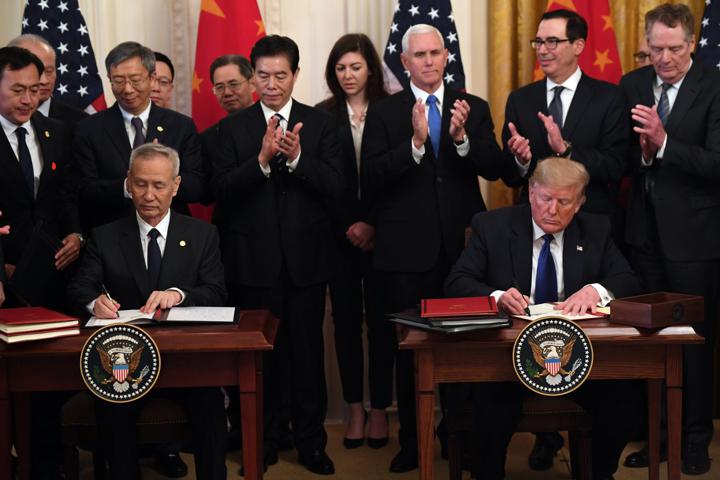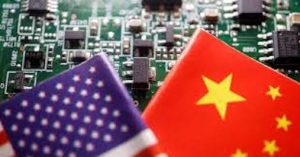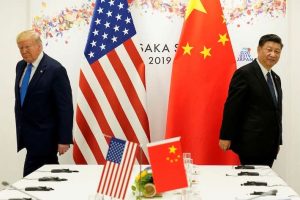By ordering the main US federal government pension fund to shun Chinese stocks, President Trump has opened a new front in America’s wide-ranging confrontation with China that risks fragmenting global capital markets.
Until now the Sino-US clash has mainly been over trade and technology. Trump, eager to demonise Beijing to help his re-election chances, has slapped tariffs on imports from China, tightened curbs on the export of sensitive goods and banned US firms from doing business with Huawei, China’s leader in 5G mobile telecommunications. Washington has also made it harder for Chinese firms to put down roots in the US: new Chinese investments in America plunged to just $200 million in the first quarter, down from $2 billion a quarter in 2019.
The result has been a decoupling between the world’s first- and second-biggest economies. Even before the coronavirus pandemic broke out, globalisation was giving way to the bifurcation of the global economy into two main camps: one led by the US, the other by China.
Trump is now accelerating this process by expanding his campaign against China to the capital markets. The president this week ordered the Federal Retirement Thrift Investment Board to drop its investment in an MSCI index that includes Chinese companies under US sanctions and export bans.
On the face of it, the move is of limited significance. Potential flows of up to $6 billion into China could be affected. But the signalling effect of the ban is much greater, especially as Trump explicitly blames China for covering up the outbreak of Covid-19. Tellingly, as the US death toll from the disease rises fast, calls from both the administration and Congress to punish Beijing are multiplying.

Before the storm: Chinese Vice Premier Liu He and the US President sign the first phase of a trade deal in the White House on January 15, 2020. More than 87,000 Americans have died of Covid-19 since then. Photo: AFP
Sanctions possible for Covid-19 ‘cover-up’
The US national security adviser, Robert O’Brien, and Trump’s national economic adviser, Larry Kudlow, warned against the investment of federal retirement dollars in Chinese firms given “the possibility that future sanctions will result from the culpable actions of the Chinese government” over the spread of the virus.
Those sanctions could be financial as well as diplomatic. A bill introduced by Senator Lindsey Graham, a close ally of Trump, envisages curbs on loans to Chinese businesses by US institutions and a ban on Chinese firms from listing on US stock exchanges if China does not allow a full outside investigation into the cause of the outbreak.
The push to cut Chinese firms off from Wall Street is gathering momentum from another source – an accounting scandal at Nasdaq-listed Luckin Coffee, which admitted last month that most of its 2019 revenue had been fabricated. The firm was worth $12 billion before it fell to earth.
Senator Marco Rubio, who introduced a bill a year ago with bipartisan support that would force Chinese firms to abide by federal auditing rules and disclosure requirements, said the Luckin fraud was “a major wake-up call for policymakers and regulators that the time for action is now”.
US regulators have never been able to examine audit documents from Chinese firms – something Beijing considers a breach of its sovereignty.
“If Chinese companies want access to the US capital markets, they must comply with American laws and regulations for financial transparency and accountability,” Rubio said.
China might be tempted to play down the warnings out of Washington as election-year noise, but the US has punished errant foreign companies in the past. In 2018 it imposed sanctions on Hong Kong-listed Rusal, a Russian aluminium producer controlled at the time by Oleg Deripaska, a tycoon close to President Vladimir Putin, over Moscow’s alleged meddling in the 2016 US presidential election. US money managers had to divest from the stock.
So, although the White House has dismissed wild talk of punishing China by cancelling the US Treasury securities it owns, Beijing faces a real threat of attack on the capital markets front.
Fixed income next?
Will other pension funds come under political and public pressure to follow the administration’s lead? If equities are the target today, what about fixed income? After all, China is now included in the main global bond indices. And if the US were to slap sanctions on Chinese firms, would American fund managers feel legally compelled to sell up?
The flap may yet blow over. Trump, forever unpredictable, may decide that Xi Jinping is his best friend after all and call off the dogs. But don’t count on it: assigning blame for the pandemic and the administration’s fumbled response to it will be a critical issue in November’s election. And if anything, Trump looks ready to ramp up tensions after vaguely threatening to break off bilateral relations.
China, for its part, has condemned Graham’s “Covid-19 Accountability Act” as immoral and has ruled out permitting an international probe.
Where does that leave us? Beijing has gone to great lengths in the past couple of years to attract foreign capital to its stock and bond markets. Forcing Chinese companies to delist from US exchanges would dent the confidence of international investors – even if Hong Kong would stand to benefit.
A split in the US-centric system
If global capital markets are balkanised, money will not be allocated as efficiently as it otherwise would be. Rather than scouring the world for the most remunerative opportunities, investors will increasingly turn inwards, focusing on either the US or the Chinese sphere of influence.
China is likely to regard the latest threats from Washington as yet another attempt to tie it down. Beijing’s likely policy response is clear: it will redouble its efforts to break free from the US-centric global financial system.
That means a renewed push to internationalise the yuan in order to escape the “hegemony” of the dollar; accelerating the take-up of CIPS, an interbank messaging system for yuan payments that would reduce reliance on the SWIFT network, on whose members the US can exert massive pressure; rolling out DCEP, the central bank’s digital currency; and global expansion of China’s world-beating digital wallets and money-transfer apps.
Who’s to say China won’t succeed in the long run? If it does, it might look back and be grateful for the backfiring of a seemingly trivial decision about American civil servants’ pensions taken at a time best remembered for a global pandemic.
ALSO READ: US-China decoupling: a reality check
Trump threatens China ties, says in no mood for Xi talks
Huawei to dodge US sanctions with SMIC chip
China sees shock industrial growth but consumers wary
Alan Wheatley is a British journalist who worked at Reuters for more than 30 years, writing about economics mainly, from Beijing, Washington, New York and many other cities.






















